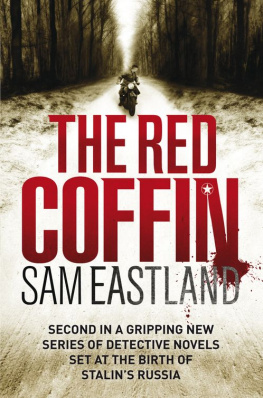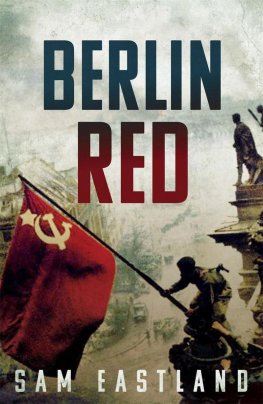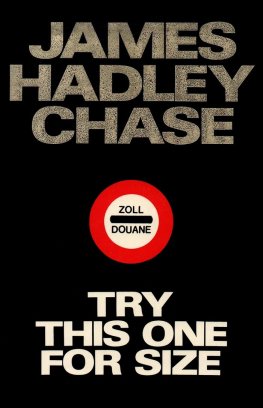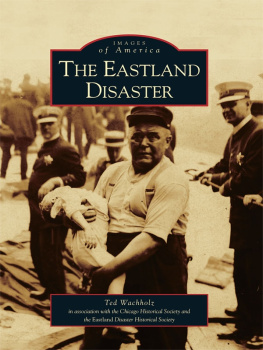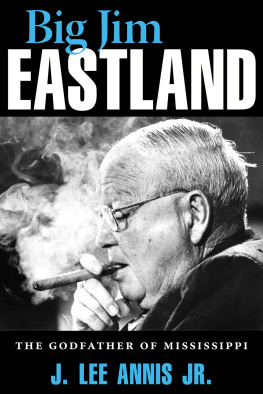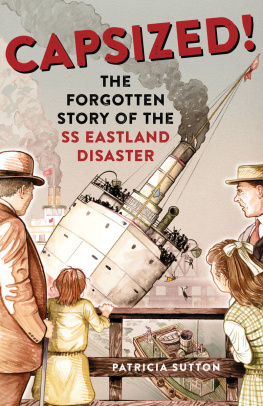Sam Eastland - Red Icon
Here you can read online Sam Eastland - Red Icon full text of the book (entire story) in english for free. Download pdf and epub, get meaning, cover and reviews about this ebook. year: 2014, publisher: Faber & Faber, genre: Detective and thriller. Description of the work, (preface) as well as reviews are available. Best literature library LitArk.com created for fans of good reading and offers a wide selection of genres:
Romance novel
Science fiction
Adventure
Detective
Science
History
Home and family
Prose
Art
Politics
Computer
Non-fiction
Religion
Business
Children
Humor
Choose a favorite category and find really read worthwhile books. Enjoy immersion in the world of imagination, feel the emotions of the characters or learn something new for yourself, make an fascinating discovery.
- Book:Red Icon
- Author:
- Publisher:Faber & Faber
- Genre:
- Year:2014
- ISBN:9780571312313
- Rating:5 / 5
- Favourites:Add to favourites
- Your mark:
- 100
- 1
- 2
- 3
- 4
- 5
Red Icon: summary, description and annotation
We offer to read an annotation, description, summary or preface (depends on what the author of the book "Red Icon" wrote himself). If you haven't found the necessary information about the book — write in the comments, we will try to find it.
Red Icon — read online for free the complete book (whole text) full work
Below is the text of the book, divided by pages. System saving the place of the last page read, allows you to conveniently read the book "Red Icon" online for free, without having to search again every time where you left off. Put a bookmark, and you can go to the page where you finished reading at any time.
Font size:
Interval:
Bookmark:
Sam Eastland
Red Icon
2 February 1945
Ahlborn, Germany, near the River Oder, 70 km from Berlin
You can always tell when a mans luck has run out.
Captain Antonin Proskuryakov of the Red Armys Kantemirovskaya Armoured Division, was fond of saying this. He would often use the expression in the presence of young officers newly arrived at the front and he greatly enjoyed the effect it had upon them. As the longest surviving tank commander in the Division, Proskuryakovs words took on the weight of prophecy.
You can see it in his eyes, Proskuryakov told these newly minted lieutenants, who would glance nervously at one another, wondering whether the curse of lucklessness might already be upon them.
But now, as Captain Proskuryakov surveyed the blazing ruins of his T34 tank, he was forced to consider the possibility that his own run of good fortune might finally have stumbled to a halt.
It was Proskuryakovs father, a former officer in the Tsars Nizhegorodsky Cavalry Regiment, who had explained to him that luck, good or bad, always travelled in threes. In the Nizhegorodsky Regiment, that was the number of horses a person could have shot out from under him, after which work would be found for the soldier as something other than a rider. It didnt matter that the death of the three animals might not have been the mans fault. What mattered was that it had happened.
This was the third T34 under Proskuryakovs command to have been reduced to uselessness, and he knew that it would almost certainly be his last.
The first tank, an early model A, had gone through the ice of a lake near Cheropovets in the winter of 1941. Although he had expected either to be executed for gross negligence or, at the very least, transferred to a penal battalion, Proskuryakov was stunned to learn, soon afterwards, that a new tank had been found for him and that he would suffer no disciplinary action. He was even awarded the Distinguished Tanker badge and a Combat Service Medal in Silver, both of which he immediately fastened to his combat jacket.
His second tank, a model C, lasted him almost a year before it was hit by a Stuka dive-bomber on the outskirts of Stalingrad. Proskuryakov had been sleeping in a foxhole a short distance from his tank when he woke to the shriek of the bomber as it plunged towards its target. Already folded almost double in his primitive shelter, he curled into an even tighter ball and clenched his teeth. There was nothing else he could do. Just when it seemed that the sound itself would shatter Proskuryakovs bones, he felt a stunning crash as a bomb landed squarely on the turret of his tank not twenty yards away. A wave of heat passed over him. Through one of the buttonholes of his cape, he saw the grass catch fire at the edge of his foxhole.
By the time Proskuryakov made it to his feet, the Stuka was nothing more than a black, smoky stain on the horizon.
He and the rest of the crew, who had been cowering in their own shelters during the attack, now stared in amazement at the ruin of their 26-ton machine. The turret, which itself weighed more than four tons, had been lifted from the chassis and now lay upside down beside the tank. On closer inspection, Proskuryakov observed that the bomb had not only wrenched away the turret but had blown a hole the size of a bathtub in the floor of the driving compartment.
In spite of the grim predictions Proskuryakov made, loudly and to anyone who would listen, regarding his future, he received no reprimand. In fact, he was commended for having the forethought to evacuate his crew as a safety precaution in the night. This earned him two more medals; the Order of Glory (Second Class) and a coveted Order of the Red Banner, as well as command of a new tank.
In addition to the impressive row of medals that he wore even when riding into combat, Proskuryakov had now begun to exhibit some of the quirks of those whose longevity had earned them a place more meaningful than any rank or decoration. One such eccentricity was a heavy leather jacket, which he had peeled from the back of a Hungarian tank man whom he found sitting cross-legged against a tree, dead and frozen solid, back in the winter of 1942.
There was no way to remove this jacket from the ice-bound man, so Proskuryakov picked up the corpse and tied it to the back of the tank. There, the Hungarian sat for days, his eyes filled with snow and hands folded like a Buddha in his lap, until a warm snap in the weather thawed him out and Proskuryakov was at last able to claim the trophy, which he had been wearing ever since along with his medals, of course.
The night before he lost his third tank, Proskuryakovs machine had developed a leaky fuel pump and he had received permission to make his way to the nearest repair depot, ten kilometres away in the village of Eberfelden.
Looks like youll be walking to Berlin, remarked a fellow tank officer.
I will ride through the streets of that city, Proskuryakov had replied indignantly, and I will do so in this beautiful machine!
With poppy-coloured flames pouring from the open hatches of his T34, Proskuryakov remembered his boast about riding into Berlin.
At first light, he had set off for the depot, bringing with him only his driver, Sergeant Ovchinikov. Proskuryakov was determined that this trip should take as little time as possible since he had just been granted leave, his first in over two years. His plan was to get the monstrous vehicle repaired, hand over temporary command to Sergeant Ovchinikov and then get on the first truck headed east towards his home in Noginsk, just outside of Moscow.
Soon, Proskuryakov told his sergeant, resting his hand lovingly upon the dull green metal of the tank, soon all of this will be yours.
Ovchinikov turned and scowled at him, his wind-burned face contrasting starkly with the pale and unwashed skin beneath his oil-stained blue overalls. Thats what the devil said to Jesus!
I know, replied Proskuryakov.
Sergeant Ovchinikov was a deeply religious man, and given to begging for Gods mercy at every possible occasion.
All this devotion irritated Proskuryakov, to the point where he felt he must either go insane or else shoot his driver and let Ovchinikovs God decide what to do about it. After what he had seen in this war, the idea of a compassionate deity struck him as darkly comical. As far as Proskuryakov was concerned, the universe was not ruled over by some capricious, bearded ancient, hand cupped to his withered ear to catch faint murmurings of adoration from his worshippers below, but rather by a vast, unfeeling mechanism, as infallible as a mathematical equation, whose intricate calculations were responsible for holding the world in balance. It was this mechanism, see-sawing endlessly back and forth with the untiring precision of a metronome, which his father had primitively referred to as luck and to which Sergeant Ovchinikov prayed, loudly and annoyingly, several times a day. The only thing which prevented Captain Proskuryakov from murdering the little driver was the off-chance that he might actually be right.
With only two kilometres to go before reaching the depot, Proskuryakov and Ovchinikov arrived at the outskirts of a village called Ahlborn. The winter snow had thawed, briefly, and the streets of this tiny settlement were thick with mud. No sooner had they entered the village than it felt to Proskuryakov as if the whole right side of the tank had been picked up by an angry giant and thrown down to the ground. He realised at once that they had run over a mine.
The T34 slewed around and then stopped.
Proskuryakov immediately threw open the top turret hatch, climbed out of the tank and jumped down to the ground, followed by Sergeant Ovchinikov.
Together, they inspected the damage.
Font size:
Interval:
Bookmark:
Similar books «Red Icon»
Look at similar books to Red Icon. We have selected literature similar in name and meaning in the hope of providing readers with more options to find new, interesting, not yet read works.
Discussion, reviews of the book Red Icon and just readers' own opinions. Leave your comments, write what you think about the work, its meaning or the main characters. Specify what exactly you liked and what you didn't like, and why you think so.

